- Home
- Joseph Bruchac
The Long Run Page 4
The Long Run Read online
Page 4
“Will you look at that?”
Travis stepped out. The gravel crunched under his feet. He lifted his chin. The heavens were filled with what looked like rivers of light. They streamed across the wide sky. They looked like waterfalls and fountains.
“The northern lights,” Cowboy Bob said. His voice was filled with wonder.
Travis felt a lump in his throat. “I never saw them before,” he said.
“And now you will never forget them, little brother.”
They stood there for a while.
“Well,” Bob said, “guess we better get going.”
“Yup,” Travis said. “Thank you.”
“Nope,” Bob replied. “Thank those dancers in the sky.”
They continued driving. Bob was talking less now. But he did point a few things out. “Little Bighorn Battlefield is over there,” he said. “That is where those Lakotas and Cheyennes wiped out George Armstrong Custer.” Bob chuckled. “But us Crows were on the wrong side that day. One of my great-grampas was scouting for old Yellow Hair.”
Travis didn’t remember falling asleep. When he opened his eyes, the truck was stopped. He was alone in the truck. Then the door next to him opened. A dark-haired woman was standing there.
“My name’s Dolly,” she said. “Same as that country singer.”
“I’m Travis.”
“So,” Dolly said, “come on, Travis.”
She took his pack in one hand and his sign in the other. Travis followed her into the house. Dolly dropped the pack by a red leather couch. There was a clock on the wall above the couch. It was five a.m.
“Bob’s already in bed and snoring. That means the spare room is taken. Will this do?”
A pillow and blanket were on the couch.
Travis nodded. It was hard to keep his eyes open. “Thank you, ma’am.”
“Dolly,” she said. “Same as the singer. The bathroom’s there. Use the green towel. Good night now.”
“Good night, Dolly.”
Ten minutes later Travis was curled up on the couch. It was a little small, but it was better than the ground.
“There really are good people in the world,” he thought. Then he fell asleep.
6
Good People
Dolly made breakfast for them the next morning. There were eggs, thick pieces of ham, and homemade bread that was still warm. There was honey and raspberry jam. Travis hadn’t had a breakfast like this for a long time.
“Good,” he said between mouthfuls. “Really good.”
“Nice to have someone who appreciates my cooking,” Dolly said. “Not like some people.” She punched Bob in the arm, but not hard.
“Ow!” Bob said, kidding. “That’s my roping arm. I think you broke it.”
“Grow up, little brother,” Dolly replied. Travis liked the way she said that. There was warmth and teasing in her voice. He could tell she really loved her brother.
Bob held up his cup. “The least you can do is give me some more coffee for my pain.”
“Ha!” Dolly said. But she poured more coffee for him anyway.
Bob took a sip.
“Good coffee,” he said. “But it’s not cowboy coffee.”
“What’s cowboy coffee?” Travis asked.
Bob smiled. “It’s strong.” Then he waited.
Travis understood what he was supposed to say. “How strong is it?”
“It’s so strong,” Bob replied, “that when you put a spoon in it, the spoon dissolves.”
They all laughed. It felt warm in Dolly’s little house. Travis wished he could stay. But he knew that wasn’t possible. He looked at Dolly.
“Thank you, ma’am,” he said. “I mean, Dolly.”
Dolly nodded. “I guess you’ll be going now? Bob told me you need to get to your grandma and grandpa’s.”
“That’s right,” Travis said. Then Dolly looked out back. “Could you do a little job for me before you go?”
“I’d be glad to.”
“Those bushes need trimming. I’ll pay you to do it.”
Travis shook his head. “This breakfast is pay enough.”
“Nope,” Dolly said. “Trim them good and I’ll pay you $20. Then Bob will drive you out to where you can hitch a ride. Deal?”
“Deal,” Travis said.
Bob pulled a pair of gloves off a shelf and handed them to Travis. “Watch out for thorns.”
Travis worked on the bushes for two hours. Some were roses. Some were cedars. He did a good job. He took out dead branches and shaped the bushes. He had trimmed shrubs before. It was one of the things he’d learned to do to make money—money that his father usually took from him to buy alcohol.
Dolly came out to see what he had done.
“My Lord!” she said. “That is as good as a professional gardener would do.” She handed Travis two bills. One was a twenty. One was a ten. Thirty dollars, not twenty.
“That’s too much,” Travis said.
“No,” Dolly replied. “You earned every cent.”
“I appreciate it, Dolly,” Travis said.
“Bob is ready to take you to the road,” Dolly said. “Our people don’t say goodbye the way most white folks do. Have a good road. That’s what we say.”
She took Travis by the hand. “Anytime you come through here, you stop in. Right?”
“Right,” Travis said. He would have said more, but it was hard to talk. Something was caught in his throat. Three times now people had been so nice to him. First Diggs, and then the old woman who might have been Cheyenne. And now Bob and Dolly. But he had to leave them behind.
“If I can ever do anything to help others,” Travis thought, “I am going to do it.”
Bob dropped him at a place where two roads came together.
“This is a good spot,” Bob said. “Most folks pause for that stop sign. Now and then, some even stop. Good luck, partner. Have a good road.”
Bob was right. Travis stood there for only ten minutes before an old, beat-up Ford truck stopped.
There were four people in the cab. They were all brown-skinned and had mustaches. They looked like brothers. The one closest to the window on the passenger side leaned his head out.
“Only going as far as Spearfish,” the man said. He looked as if he was about thirty years old. “Just fifty miles. And you have to ride in the back. That okay?”
“Sure,” Travis replied. “Anything will help.”
“Cool. You can sit in our grandma’s chair. We just got it fixed and we’re bringing it to her.”
Travis climbed in the back, where there was a big green reclining chair. It was tied down with ropes. He sat in it, facing backward.
The gears ground as the truck lurched forward. It felt as if it might fall apart. But as soon as the truck picked up enough speed, it ran smoothly. Still, it wasn’t fast. Every other car on the road passed them. Some honked their horns and looked annoyed. Some smiled and waved at Travis. He smiled and waved back at them. The sun was shining. The wind was whipping his hair around his face.
“This is a good road,” he thought.
Someone tapped his shoulder. A hand had reached around the chair. It was another one of the four men. He had slid open the back window.
“Want some?” the man said. He held out a donut.
Travis took it. It was covered with sugar that stuck to his fingers. “Thanks,” Travis said.
The man nodded and slid the window shut again.
Travis broke off a small piece of the donut. He held it up to the sun. “Thank you,” he said. Then he tossed a little piece of donut onto the roadside. It was something his grandparents had taught him to do, a way to share what you were given with nature.
They passed through Moorcraft and went another ten or fifteen miles. Then they pulled over to the side of the road.
“Break time,” the driver said. He nodded toward some nearby trees. “Bathroom’s over there.”
Travis understood. There wasn’t really a bathroom. But you cou
ld relieve yourself behind those trees. Two of the brothers were already over there doing that.
When Travis got back to the truck, all four men were just standing there. They were facing north. One of them beckoned to Travis.
“Up there, son. Look up there.”
Travis looked. He wasn’t sure what he should look for.
“Tsoai-talee,” the man said. He looked to be the oldest brother.
“They call it Devil’s Tower,” the youngest brother said. “Remember that movie? Close Encounters?”
Travis nodded. He’d seen it on the Syfy channel at Lenny and Lenore’s house.
“It’s a sacred place for our people,” the oldest brother said. “It rose up from the ground to save some children from a bear trying to get them. You can see its claw marks on the side. Then those children stepped up into the sky and became stars. Think of that.”
They stood there for a while, all of them thinking of that.
“Okay,” the oldest brother said.
They piled into the truck. Travis climbed in the back. The gears ground again. The truck lurched and shook even worse than before as they pulled back onto the road.
They didn’t stop in Spearfish but instead drove through the town before stopping.
“Okay,” the oldest brother said. “It’s a good spot here to grab a ride.”
Travis hopped down. The truck turned around and headed back into Spearfish. None of the brothers looked back as they drove away.
“I never learned their names,” Travis thought. “But that’s okay.”
He added them to his mental list of good people.
7
Sioux Falls
Travis looked down the road. He had been standing there for hours and no one had stopped. It was dark. He was near a town called White Lake in South Dakota. It had taken him two more rides to get here from Sturgis.
A big car was heading his way. It looked like a Cadillac. Travis held up his sign. The car shot past him close, so close the sign was almost knocked from his hand. Then he saw the red flash of brake lights, bright as fire in the dark. The car screeched to a stop fifty yards beyond him.
An arm reached out the driver’s window and waved to him. It looked like a woman’s arm. Charm bracelets dangled from her wrist.
“Come on,” a woman’s voice shouted. “Come on! I haven’t got all day.”
Travis ran up to the car. He opened the door.
“Get on in.”
He had barely gotten into the seat when the woman thrust her foot down on the accelerator. The wheels spun on the gravel and then squealed as they caught the pavement. Travis almost fell out. He grabbed the door handle and pulled the door shut. The car was still picking up speed. He clicked his seat belt. There was a familiar smell in the car. Too familiar. It smelled like his father’s breath when he’d been drinking.
“Oh no,” Travis thought.
He looked over at the woman. It was hard to tell how old she was. She was wearing a yellow pantsuit. She had long auburn hair and a lot of makeup on her face. She smiled at him. Her smile was crooked.
“What a nice-looking boy,” she said. Then she pushed her foot down even harder on the gas.
Travis tried not to look her way. She was waving her arm at him as she talked. He was glad it was a big car and her arm couldn’t reach him.
“You can come to my house, honey,” she told him. “Just over the border in Iowa. You’re a nice boy, aren’t you?”
The miles flashed by.
“What can I do?” Travis thought. “What can I do?”
It was after midnight when they drove into Sioux Falls. There was a stoplight. As soon as the car stopped, Travis opened his door. He jumped out.
“Where you going?” the woman said. Her voice was slurred. “We’re not there yet.”
“Thank you, ma’am,” Travis said. “This is far enough.”
“You come back,” the woman yelled. She held up a cell phone. “Come back now or I’ll call the cops!”
Travis ran. It was the only thing he could think to do. He could hear the woman screaming from her car. One block, two blocks, three blocks. Finally he couldn’t hear her anymore.
Maybe she’s given up. Maybe she’ll just keep going.
He kept running. The streets were empty. He was the only one around.
“I’ll be okay,” he thought. “I’ll be okay.”
He ran down a hill toward a huge brick building that looked old. Maybe it was some sort of hotel. He turned the corner and almost ran into a black-and-white car parked facing the other way. A red light was on top of that car. A police car! With a policeman standing next to it. He was talking into a microphone clipped to his shoulder.
Travis stopped and looked at the policeman. The policeman looked at him.
“No,” Travis thought. “No!” He turned and began to run again.
“Stop!” the policeman yelled.
Travis ran harder. There were big statues all along the street. If he wasn’t being chased he would have stopped to look at them. One was a huge stone walrus with its baby. Another was an eagle made out of scrap iron. He turned a corner and leaped over a bunch of garbage bags piled on the sidewalk under a streetlight. He could hear the policeman’s feet slapping the pavement behind him. But the sound of the man’s feet was getting further away. Travis was faster than most boys his age and faster than most men. He ran easily. His heart was pounding, but he wasn’t running out of breath. He really did have the gift of running.
He was getting away.
He grabbed a drainpipe on the side of a red brick building and used it to spin himself into a narrow alleyway. That was a mistake. There was something in front of him. It was fifty feet ahead, visible in the pool of light from a window. It was a mother cat lying on her side, right in the middle of the narrow passage. There were seven little kittens feeding from her.
“I could leap over them,” Travis thought.
But would the policeman behind him do that? Would he step on one of those kittens as he chased Travis?
Travis could not bear the thought of that. If one of those kittens got hurt it would be his fault. He stopped. The mother cat looked up at him but didn’t look worried.
“Move,” Travis said. The cat didn’t move.
Travis knelt down. He picked up a handful of kittens and gently placed them to the side behind a box. They would be safe there. He picked up a second handful. The mother cat was standing now. She was stretching and looking lazy.
A hand grasped Travis by the shoulder. He looked up and saw the policeman. He was tall and skinny. There was sweat on his face. He was breathing hard.
“What are you, boy, some kind of track star?” he said, panting.
Travis didn’t answer. “I’m an idiot,” he thought. But he didn’t say that out loud. He just kept quiet.
The policeman bent down. “Don’t you know there’s a curfew here for teenagers?”
Travis could answer that. “No, sir,” he said. “I was just passing through. Someone just dropped me off here. I’d hitched a ride.”
Travis waited. Had the drunk woman called the police?
“Why’d you run?”
“I don’t know, sir. I just got scared, I guess.”
The man studied Travis’s face in the light from the window. Travis could see the policeman’s face in that light too. He had thick brown hair under his cap. Travis noticed the man needed a shave. The man’s brow was knitted. His lips were tight. His face was red from running. He looked angry. His name was written on a strip of metal pinned to his shirt: “Sergeant Ray Abourezk.”
“I am going to jail,” Travis thought.
“Stand up,” Sergeant Abourezk said. His voice wasn’t angry. It was businesslike. A policeman doing his job.
Travis stood.
“Lean against the wall.”
Travis leaned. The sergeant took the backpack off Travis’s shoulders. He ran his hands down Travis’s body.
“No weapons?”
The sergeant took the knife off Travis’s belt.
“Now he’s going to handcuff me,” Travis thought. But the sergeant didn’t do that.
“Turn around,” he said.
Travis turned.
The sergeant lifted his hand to his chin and looked at Travis.
“Got any ID?”
Travis pointed at his backpack with his chin. “In there, sir.”
“Will you show me what’s in there?”
“Yes, sir.”
The sergeant stepped back a little. “Open it and dump everything on the ground.”
Travis bent down and undid the straps. He carefully emptied the contents onto the pavement.
The sergeant pointed at the deerskin bag. “What’s that?”
“A fire-making kit.”
“Open it.”
Travis opened the bag. He carefully took out the contents, naming them as he did. “Flint and steel, tinder, nylon cord for a bow drill, steel wool, a battery.” He looked up at the sergeant, who was shaking his head.
“Fire-making,” the sergeant said. “Okay, put it away. Now hand me the wallet.”
Travis did that. The sergeant opened it and looked at the ID. He looked at Travis. He looked at the ID again.
“Travis Hawk,” the policeman read aloud. “Washington State driver’s license?”
“Yes, sir. I just got it. I took Driver’s Education. I got an A in it. I don’t have a car. But I do have a license now.”
“I’m talking too much,” Travis thought. He suddenly remembered something that Will Chan had told him. When a policeman stops you, keep your answers simple. Police like to get you to start talking. The more you say, the worse it gets for you.
Travis shut his mouth.
“Where you going, Travis Hawk?”
“What can I say?” Travis thought. Then he remembered what Grandma Kailin often said. Tell the truth. That’s easier to remember than a lie.
“Maine, sir.”
“All that way and this,” the sergeant gestured at the few items in Travis’s pack, “is all you have with you?”

 Peacemaker
Peacemaker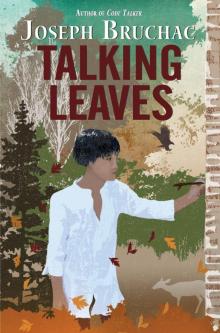 Talking Leaves
Talking Leaves Found
Found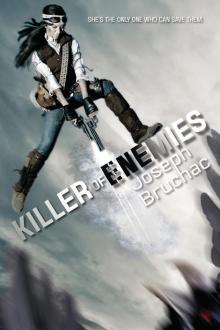 Killer of Enemies
Killer of Enemies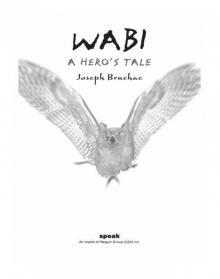 Wabi
Wabi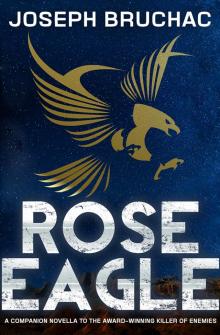 Rose Eagle
Rose Eagle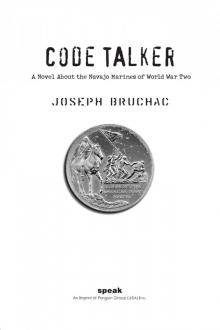 Code Talker
Code Talker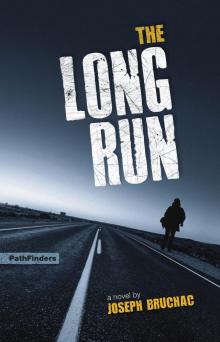 The Long Run
The Long Run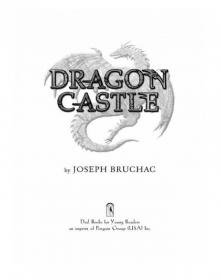 Dragon Castle
Dragon Castle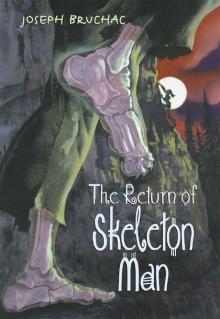 The Return of Skeleton Man
The Return of Skeleton Man Pocahontas
Pocahontas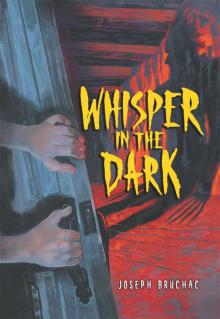 Whisper in the Dark
Whisper in the Dark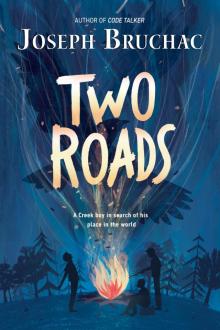 Two Roads
Two Roads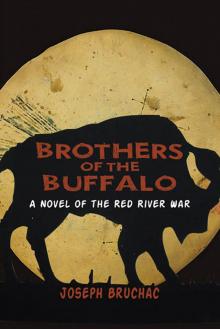 Brothers of the Buffalo
Brothers of the Buffalo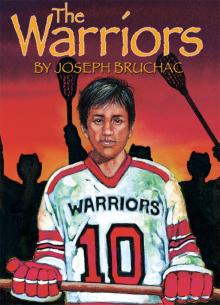 The Warriors
The Warriors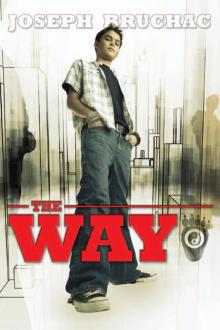 The Way
The Way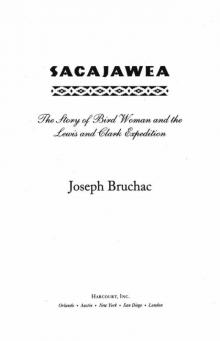 Sacajawea
Sacajawea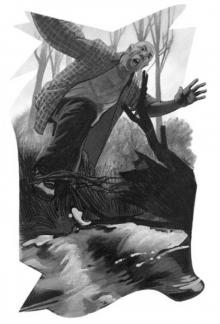 Night Wings
Night Wings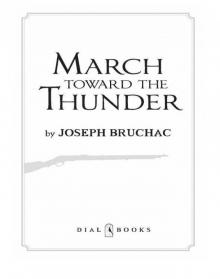 March Toward the Thunder
March Toward the Thunder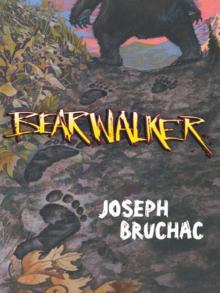 Bearwalker
Bearwalker Skeleton Man
Skeleton Man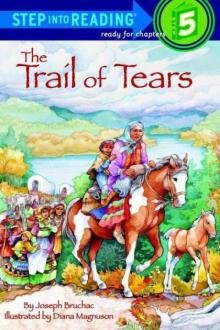 The Trail of Tears
The Trail of Tears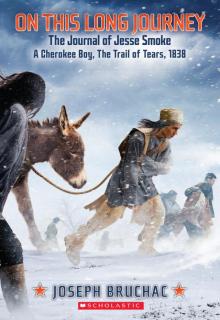 On This Long Journey
On This Long Journey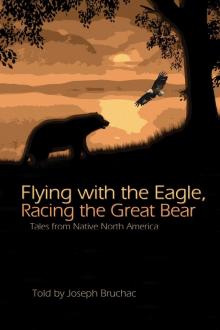 Flying with the Eagle, Racing the Great Bear
Flying with the Eagle, Racing the Great Bear